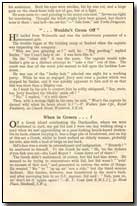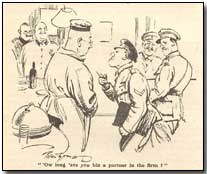Memoirs & Diaries - The Best 500 Cockney War Stories - "...Wouldn't Come Off" and Other Stories
 Published in London
in 1921, The Best 500 Cockney War Stories
comprised, in the words of its newspaper publisher (The London Evening
News) "a remembering and retelling of those war days when laughter
sometimes saved men's reason".
Published in London
in 1921, The Best 500 Cockney War Stories
comprised, in the words of its newspaper publisher (The London Evening
News) "a remembering and retelling of those war days when laughter
sometimes saved men's reason".
The collection of short memoirs, some 500 in total, is divided into five categories - Action, Lull, Hospital, High Seas and Here and There. This page contains five stories from Here and There, led by "...Wouldn't Come Off".
Other sections within the collection can be accessed using the sidebar to the right.
"...Wouldn't Come Off"
He hailed from Walworth and was the unfortunate possessor of a permanent grin. The trouble began at the training camp at Seaford when the captain was inspecting the company.
"Who are you grinning at?" said he. "Beg parding," replied Smiler, "but I can't help it, sir. I was born like it."
On the "other side" it was the same. The captain would take Smiler's grin as a distinct attempt to "take a rise" out of him. The result was that all the worst jobs seemed to fall upon the luckless Londoner.
He was one of the "lucky lads " selected one night for a working party. While he was so engaged Jerry sent over a packet which was stopped by Smiler, and it was quickly apparent to him and to us that this was more than a Blighty one.
As I knelt by his side to comfort him he softly whispered, "Say, mate, has Jerry knocked the blinkin' smile off?"
"No," I replied, "it's still there."
Then, with a strange light in his eyes, he said, "Won't the captain be darned wild when he hears about it?"
P. Walters (late Cpl., Royal Fusiliers), 20 Church Street, Woolwich, S.E.18
When in Greece...?
On a Greek island overlooking the Dardanelles, where we were stationed in 1916, my pal Sid and I were one day walking along a road when we saw approaching us a poor-looking knock-kneed donkey.
On its back, almost burying it, was a huge pile of brushwood, and on top of this sat a Greek, whilst in front walked an elderly woman, probably his wife, also with a load of twigs on her back.
Sid's face was a study in astonishment and indignation.
"Strewth!" he muttered to himself. To the Greek he said, "Hi, 'oo the dickens d'you fink you are - the Lord Mayor? Come down orf of there!"
The Greek didn't understand, of course, but Sid had him down. He seemed to be trying to remonstrate with Sid, but Sid wasn't "'avin' no excuses of that sort," and proceeded to reverse the order of things.
He wanted "Ma" to "'op up an' 'ave a ride," but the timid woman declined. Her burden, however, was transferred to the man's back, and after surveying him in an O.C. manner, Sid said: "Nah, pass on, an' don't let it 'appen again."
H. T. Coad (late R.M.L.I.), 30 Moat Place, Stockwell, S.W.9
The Chef Drops a Brick
At a prisoners of war camp, in Havre, it was my duty to make a daily inspection of the compound within the barbed wire, and also the officers' quarters.
In charge of the officers' mess was a little Cockney corporal, but practically all the cooking and other work was done by German prisoners. We had just put on trial a new cook, a German, who had told us that he had been a chef before the war at one of the big London hotels.
I was making my usual inspection with my S.M., and when we came to the officers' mess he bawled out "'Shun! Officer's inspection, any complaints?"
The new German cook apparently did not think that this applied to him, and, wanting to create a good impression, he strolled across to me in the best maitre d'hotel style, and exclaimed, "Goot mornung, sir. I tink ve are go'n to haf som rain."
Our little corporal appeared astounded at this lack of respect, and, going over to the German, he said in a loud voice: "Put thet knife dahn, an' stand to attention. Ve'r gorn to 'ave some rine, indeed!"
And then, in a louder voice, "Ve are. 'Ow long 'ave you bin a partner in the firm?"
Lieut. Edwin J. Barratt (Ex-"Queens" R.W. Surrey Regt.), 8 Elborough Street, Southfields, S.W.18
His "Read" Letter Day
At Sorrel le Grand, which our division had just taken in 1917, we took up a good position for our machine gun in a small dug-out. I was cleaning my revolver on one of the steps, and it accidentally went off.
To my surprise and horror the bullet struck one of my comrades (who was in a sitting position) in the centre of his steel helmet, creating a huge dent.
His remark was: "Lummy, it was a jolly good job I was reading one of my girl's letters," and then continued reading.
Robt. Fisher (late Carpi., M.G.C.), 15 Mayesbrook Road, Goodmayes, Essex
Dan, the Dandy Detective
Jerry's front line trench and ours were not three hundred yards apart.
Over that sinister strip of ground attack and counter-attack had surged and ebbed in a darkness often turned to day by Verey lights and star-shells. Brave men on each side had reached their objective, but "fell Sergeant Death" often took charge.
In our sector was a 1914 "Contemptible," who, despite mud and adverse conditions, made his New Army comrades smile at his barrack-room efforts to keep his uniform and equipment just so.
Of Coster ancestry, his name was Dan, and, of course, they called him Dandy. He felt distinctly annoyed when on several days an officer passed him in the trench with the third button of his tunic missing. "'Is batman ought bloomin' well be for it," he soliloquised.
Another night visit to Jerry's trench, and again some poor fellows stay there for keeps.
In broad noonday Dan is once more aggrieved by seeing an officer with a button missing who halts in the trench to ask him the whereabouts of B.H.Q. and other details. The tunic looked the same, third button absent, but it was not the same officer.
Now Dan's platoon sergeant, also a Londoner, was a man who had exchanged his truncheon for a more deadly weapon. Him Dan accosts: "I've a conundrum I'd like to arsk you, sergeant, as I don't see Sherlock 'Olmes nowhere. W'y do orficers lose their third button?"
As became an ex-policeman, the sergeant's suspicions were aroused by the coincidence, so much so indeed that he made discreet enquiries and discovered that the original owner of a tunic minus a third button had been reported missing, believed dead, after a recent trench raid.
The adjutant very soon made it his business to intercept the new wearer and civilly invite him to meet the O.C. at B.H.Q. Result: a firing party at dawn.
When the news of the spy filtered through, Dan's comment was: "Once, when a rookie, I was crimed at the Tower for paradin' with a button missin', but I've got even now by havin' an orficer crimed for the same thing, even if he was only a blinkin' 'Un!"
H. G., Plaistow
Next - The Apology and four other stories
Russia mobilised 12 million men during the war; France 8.4 million; Britain 8.9 million; Germany 11 million; Austria-Hungary 7.8 million; Italy 5.6 million; and the USA 4.3 million.
- Did you know?

